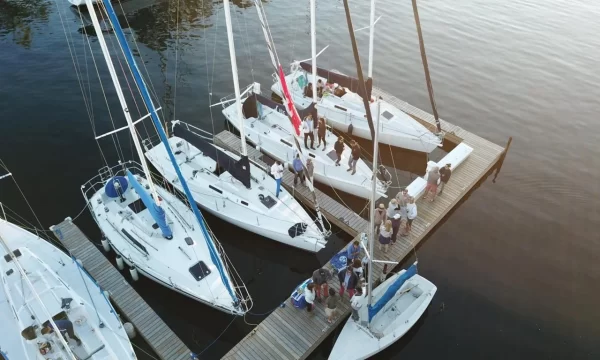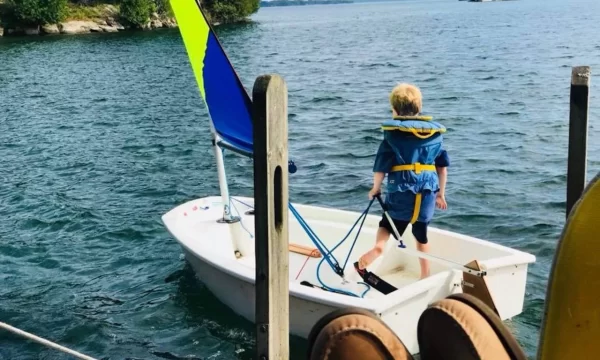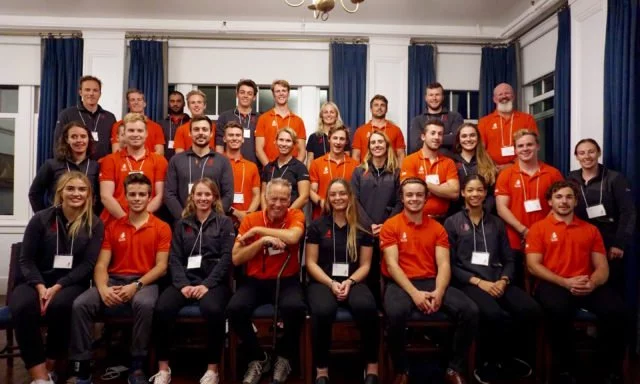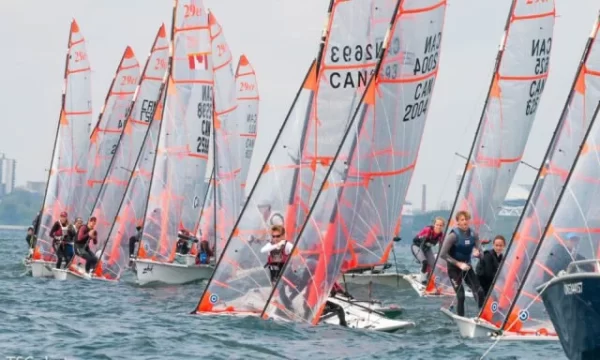CANSAIL PARA
For persons with a disability, the sense of freedom and independence associated with sailing is unrivaled. Sailing is one activity where, because of adaptive technology, even people with severe physical limitations can participate equally with able-bodied persons.
OVERVIEW
Sailing enables those with disabilities to enrich their lives and build confidence in a way no other similar activity can. Disabled sailing programs provide empowerment, motivation, and quality of life for people with physical disabilities.
Visit the Able Sail Network website to find out more about Able Sail programs across Canada: www.ablesailnetwork.com
The CANSail program is based on the long term athlete development and is designed as a set of progressive learn to sail standards focused on providing sailors with a solid foundation of core skills. CANSail allows sailors to learn and progress in any type of boat and consolidates key skills and solid experiences before adding complex skills. The CANSail Para checklists and rubrics include additional suggestions and adaptations that will help to better train and evaluate the skills of sailors who have disabilities.
SURVEY
Sail Canada is working to better understand the Para sailing environment and in Canada and the experiences of Program Leaders, Coaches, Instructors, Volunteers and Athletes and Sailors. If you are involved in Para sailing in any of these areas we’d love to hear from you and invite you to complete the survey that best fits your role within the Para sailing environment.
Survey 1 – Program Leaders
Survey 2 – Coaches/Instructors/Volunteers
Survey 3 – Athletes/Sailors
INTRODUCTORY PROGRAMS – FUNDAMENTAL SKILL ACQUISITION
- CANSail Para 1 – Offers an introduction to sailing, that provides sailors with the basic fundamental sailing skills, including sheeting, steering, and boat handling on all points of sail. This program is part of the ‘Fundamental’ stage of the Long Term Sailor Development Framework.
- CANSail Para 2 – Continues to build on the basic skills introduced in CANSail 1. Sailors learn to use steering and weight to change direction and adjust to changes in wind speed while sailing. This program is part of the ‘Fundamental’ stage of the Long Term Sailor Development Framework.
INTERMEDIATE PROGRAMS – FUNDAMENTAL SKILL CONSOLIDATION
- CANSail Para 3 – Sailors integrate the fundamental boat handling manoeuvers and techniques they have learned in the previous levels with applied sail trim as well as basic tactics and strategy. Sailors may participate in a club race or training camp. This program is part of the ‘Learn to Sail Fast’ stage of the Long Term Sailor Development Framework.
- CANSail Para 4 – Teaches sailors to perform more advanced boat handling manoeuvers in a wider variety of conditions. Sailors have refined the fundamental skills learning at the introductory stage and can successfully execute manoeuvers in higher pressure settings, or for tactical and strategic purposes. Sailors may participate in a one or two-day local regatta. This program is part of the ‘Learn to Sail Fast’ stage of the Long Term Sailor Development Framework.
ADVANCED PROGRAMS – APPLIED SKILL ACQUISITION
- CANSail Para 5 – Fully integrates boat handling skills with tactics and strategy. Performance and refinement of skills become the main focus. Sailors are introduced to rig tuning and its relation to boat trim for different conditions and participate in a one or two-day local regatta. This program is part of the ‘Learn to Train’ stage of the Long Term Sailor Development Framework.
- CANSail Para 6 – Fully integrates boat handling, sail trim, and rig setup with racing. Sailors train to perform skills in a competitive race setting in order to achieve performance in all conditions. Sailors participate in a regional or provincial regatta and focus on training plans that include shoulder season programs. This program is part of the ‘Learn to Train’ stage of the Long Term Sailor Development Framework.
MORE ABOUT THE CANSAIL PARA PROGRAM
It is important to deliver strong and consistent para sailing programs across the country at the grassroots and development levels in which sailors can progress. The CANSail Par guide contains information for Provincial Sailing Associations, program administrators, learning facilitators, instructors, coaches, volunteers and sailors. Topics include CANSail Para Checklist and Rubrics, Coaching Athletes with a Disability (CAWAD), program guidelines, community alignment, Long Term Athlete Development, best practices recommendations, info-graphics, a resource library and more.
HELPFUL LINKS
Canadian Paralympic Committee: www.paralympic.ca
International Association for Disabled Sailing: https://www.sailing.org/our-sport/para/
Blind Sailing International: www.blindsailinginternational.com
AbleSail Network Resource Page: ablesailnetwork.com/resources
DELIVERY OF THE CANSAIL PARA PROGRAM
There are many ways to deliver the CANSail program. Sailing clubs or schools may choose to deliver the CANSail program in different formats which include evening, weekend, and full-day programming. The CANSail standards are designed to be flexible so that sailors can work on skills from different levels at the same time and take part in a program that works best for them.
Sailors may progress through CANSail in a daily summer program or on weekends at their local club. Those interested in racing may choose to join a club race team and complete elements of the CANSail program while sailing with their team. There are lots of ways to progress through the CANSail Program, find one that is right for you!
CANSAIL DINGHY INSTRUCTORS
The CANSail program can only be delivered by current CANSail Instructors who have completed their annual Sail Canada Registration and maintained all their prerequisite certifications.
CANSail Instructors are Trained and Certified following the Coaching Association of Canada, National Coaching Certification Program. Any Instructor or Coach seeking the training to become CANSail accredited should check with their Provincial Sailing Association
FIND AN INSTRUCTOR OR COACH








